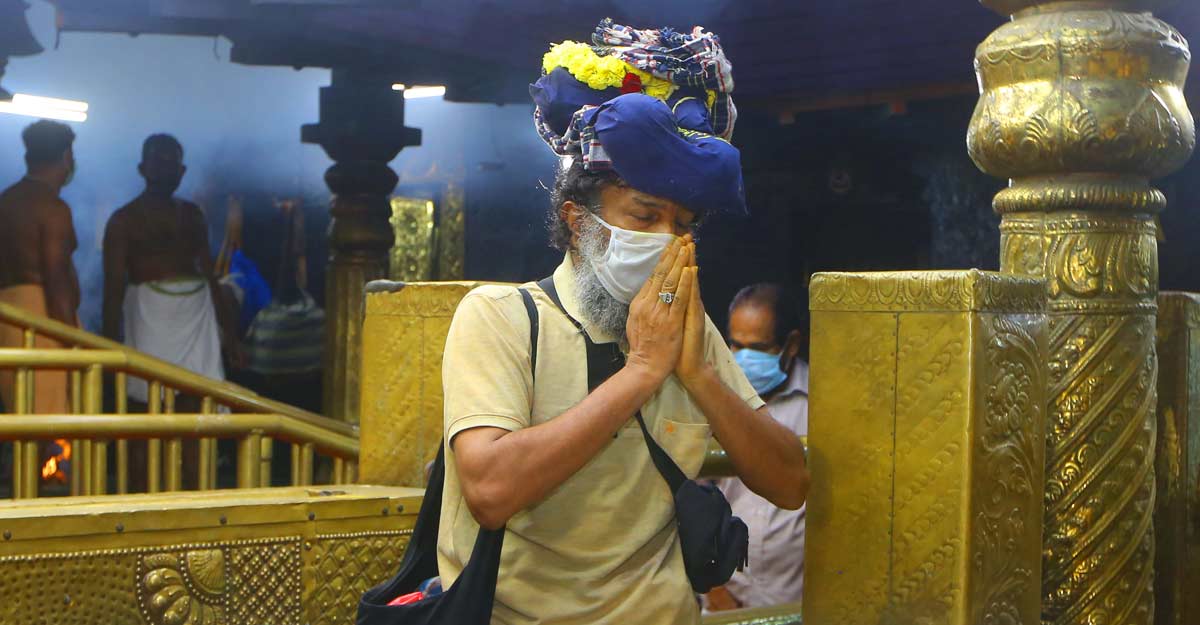Sabarimala pilgrimage begins today with strict COVID norms | All you need to know

Mail This Article
The renowned Lord Ayyappa Temple at Sabarimala in Kerala has allowed pilgrims to pray at the shrine from Monday (November 16) as part of the Mandalam-Makaravilakku season which lasts up to January 20, 2021. However, several old traditions would witness a change this time considering the COVID-19 situation. In fact, the authorities have announced a slew of regulations to prevent the spread of the pandemic.
Virtual queue
Pilgrims who wish to reach the temple have to make a booking on the virtual queue system of the Kerala police. Others will not be allowed to undertake the pilgrimage. The number of pilgrims is restricted to 1,000 on weekdays and 2,000 on Saturdays and Sundays. However, for the ‘Mandala puja’ ritual on December 26 and ‘Makaravilakku’ on January 14, as many as 5,000 people would be allowed to visit the temple.
Children below the age of 10 years and senior citizens aged above 60 years cannot reach Sabarimala during the present season. Another regulation says that pilgrims should not form crowds at the shrine.
COVID-19 certificate
All pilgrims have to carry a COVID-19 certificate in a test done within 24 hours of arrival. Test facility would be available at the hospital near Mahadeva Temple, Nilakkal and for antigen test at primary health centre, Erumely. Pilgrims can conduct the test also at private laboratories recognized by the Health Department.
A printout of the virtual queue booking should be carried by pilgrims, along with an identity proof submitted at the time of booking and a medical certificate to prove that they are fit to undertake the steep climb. In addition, they should possess sanitizer, mask and gloves.
Entry at Pamba
This season, entry would be allowed only through Pamba and devotees have to take either Vadasserikkara – Laha – Pamba or Erumely – Kanamala – Pamba route to reach the place. The authorities have banned treks along the forest routes, including the traditional forest path connecting Kalaketty, Azhutha and Karimala. Another forest path through Vandiperiyar, Sathram and Pullumedu would also be off-limits for pilgrims this year. Another blocked route is Neelimala – Appachimedu. Everyone visiting the shrine should ascend and descend the hill taking the Swamy Ayyappan Road, said the authorities.
However, pilgrims can head to Sannidhanam along Chandranandan Road from Marakkoottam. They can also trek along Saramkuthi.
All pilgrims should wear masks, except while climbing the hill, according to the new rules.

Holy dip at Pamba banned
In a major departure from tradition, the authorities have banned ‘Pamba snaanam’, or the holy dip in the River Pamba this time. Instead, the pilgrims can wash themselves under the showers arranged by the authorities on Manalpuram (sandbank of the river). Travancore Devaswom Board (TDB), which owns the temple, has also built washrooms at Pamba and Nilakkal.
Ritual at Pamba temple
Pilgrims can carry out the ‘kettunira’ ritual at Ganapathy Temple, Pamba. It involves filling various items in the kit carried by the pilgrims to the shrine. All these items would be provided by TDB on paying an amount of Rs 300, but pilgrims should carry a towel.
Drinking water
Steel flasks containing water with the flavour of dried ginger is available at Pamba for Rs 100. On the way up, the flasks could be refilled at two spots on Swamy Ayyappan Road. The amount will be refunded when the flasks are returned.
At the shrine
This year, pilgrims have to walk along the right side of the flagstaff after climbing the ‘pathinettampadi’ (18 holy steps) to the sanctum sanctorum. Specified spots are marked for devotees to wait while in queue and pilgrims would be allowed to proceed along the first and the last of the three rows in front of the shrine.
After having ‘darshan’ of Lord Ayyappa, devotees can proceed to Malikappuram Temple. ‘Prasadam’ will be available and counters selling the delicacies of ‘appam’ as well as ‘aravana’ would function.
Curbs on ‘neyyabhishekam’
As devotees cannot perform ‘neyyabhishekam’ (ghee offering) directly, they should deposit the coconuts filled with ghee at a TDB counter. The priests would break the coconuts at a suitable time and conduct the ritual, while the devotees can collect the ghee used for the ceremony from a Devaswom counter.
Meanwhile, the authorities have banned ‘pushpabhishekam’ (offering of flowers) and allowed ‘ashtabhishekam’. However, the items for the latter ritual will be provided by TDB.
Free food
‘Annadanam’, or serving of free food, has been arranged by TDB and Ayyappa Seva Sangham. Moreover, a few shops and hotels will also function.
‘Prasadam’ by post
Pilgrims who cannot travel to the temple can book ‘prasadam’ at any post office in India and it would be delivered at their address. The form for the purpose is available at the post offices and could be submitted there along with a fee of Rs 450. The ‘prasadam’ packet would contain ‘aravana’, ghee used for ritual (aadiya neyyu), ‘vibhooti prasadam’, yellow turmeric and ‘kunkum’.
No stay allowed
Yet another crucial change from last season is the ban on stay at Sannidhanam (‘viri veykkal’) for the night. As part of the restriction, guest houses, pilgrim centres and other accommodation facilities would not be allowed to rent rooms for pilgrims.
‘Dolli’ services allowed
Pilgrims facing difficulties in climbing the hill can utilize the ‘dolli’ services, where workers carry them to the temple. Apart from issuing passes to ‘dolli’ operators, the workers would be subjected to COVID-19 test.

